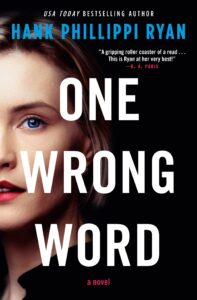Think about the words you see in a rave book review. Pacey. Propulsive. Riveting. Compelling. Page-turner. And those are all shorthand for “fun to read,” and for “something happens.” And also for “I cannot wait to find out what happens next.” Problem is, it’s textbook-easy to begin a novel and have something happen: that’s why there’s a story. But to keep your story going, to keep it pacey and propulsive, things must keep happening. And at every moment, the reader must be compelled to turn the page.
Every writer knows it can be daunting to keep the engine of your book running. But suspense is the fuel that makes it accelerate. But here’s news you can use: you can create suspense in very sentence. And you can pack your pages with so much suspense that it becomes a coveted one-sitting read.
Suspense starts from moment one. At every moment, make sure you are writing about
A person who the reader cares about,
Who wants something very deeply,
Where there are obstacles in their way.
AND
Where the stakes are incredibly high, life-changingly high, irrevocably amazingly high.
And where if your character fails, it would be devastating. And even deadly.
(And your words will be the emotional soundtrack to the story. Try imagining, as you’re writing, what kind of music would be playing in the background in the movie of this novel.)
And when you give your readers those elements, it will keep them turning the pages. How do you do that in your book?
Here are my seven rules of suspense. Seven things to remember as your manuscript unfolds. What suspense is–and what is it not.
Suspense is not something that is added to your story
Suspense is the essence of your entire story. From moment one. A story is about something happening—but “will it happen?” is the question engine that drives it forward.
Suspense is not confusion
And confusion is not suspense. When you withhold information simply as a device to keep people reading, they will not keep reading. They will stop reading. Because they will be confused.
Readers do not want to have people behaving in unexpected ways, for instance, on page 1, 2, and 3, only to have it revealed on page 4 that they are on Mars. They will not read far enough to discover they are on Mars. They will simply say “I have no idea what’s going on and I’m not interested enough to find out.”
Suspense is when the reader KNOWS that the character wants
Or hopes for or is worrying about or expects—and wonders cares and worries and expects WITH THEM.
If you are on Mars, say so. Put the reader into the story with the character. If the character knows it, reader should know it. They are on the journey to discovery together.
Suspense is not surprise
Surprise is surprise, that’s fine. But there’s no better example than the one Alfred Hitchcock used. He said: If you read a scene where two people are sitting at a lunch table on the piazza and boom! A bomb goes off. That’s surprise.
Two people at a lunch table on the piazza and you the reader knows there’s a bomb under the table..and you know they don’t know.. and, as they casually chit-chat, you’re waiting and worrying…will they escape? Leave, you think! Leave! That’s suspense.
Suspense is when something is supposed to happen
You cannot have suspense unless something is supposed to happen. Unless someone wants something to happen. Expects it. Yearns for it. Needs it. Must have it or all is lost. And then the intense and burning question is–will that happen? The rocket goes up… The car shifts into third… The phone rings… Will it work? Will it fail? What will be the result if what we wish for does not happen?
Suspense is only possible when the reader cares
You cannot have suspense unless the reader cares about the character. Make it personal. Up close and personal. Have your made your character a person the reader is completely invested in? What relatable characteristics and motivations can you give then? Maybe–protection of a loved one. Passion for a career, that others are relying on them. That this is the one chance they’ve always dreamed of, the one moment that will change their lives forever, the one risk they can take for a massive greater good.
Suspense is obstacles and conflict
Suspense is how someone or something is always in the way of your character’s success. Every time they think they’ve won the day—they haven’t. Where does your character get the wherewithal, the perseverance, the courage and the will to battle through, no matter what? Create an obstacle, and let the character’s grit shine through.
Suspense is time
Especially in a thriller. At every second of your novel the clock should tick tick tick, relentlessly and constantly. Deadlines, ultimatums, requirements, demands—a constant state of “or else!”—will keep readers flying through your pages.
So how can you make that work in your stories? Watch for part two, in my next Career Authors post. (See? That’s suspense.)
But meanwhile, what other methods do you use to create suspense in your stories? Let’s talk about it on the Career Authors Facebook page.
 USA Today Bestselling author Hank Phillippi Ryan is a founding member of Career Authors, and will teach a class in suspense and dramatic storytelling at the upcoming Career Authors writing retreat to be held in April 2024. Her fifteenth thriller, coming February 6, is ONE WRONG WORD, which David Baldacci calls “A story with all the goods―great characters, blistering pace, powered by prose that cuts right to the nerve.”
USA Today Bestselling author Hank Phillippi Ryan is a founding member of Career Authors, and will teach a class in suspense and dramatic storytelling at the upcoming Career Authors writing retreat to be held in April 2024. Her fifteenth thriller, coming February 6, is ONE WRONG WORD, which David Baldacci calls “A story with all the goods―great characters, blistering pace, powered by prose that cuts right to the nerve.”





